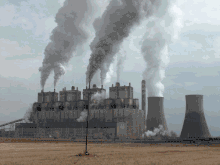Afşin-Elbistan power stations
The Afşin-Elbistan power stations are coal-fired power stations in Afşin in Kahramanmaraş Province in Turkey. The area is a sulfur dioxide air pollution hotspot.[1]
Coal
Local lignite's calorific value is under 5 MJ/kg, which is a quarter of typical thermal coal.[2]
Afşin-Elbistan A

Afşin-Elbistan A power station is a 1355 MW lignite-fired power station, owned by Çelikler Holding, which was shut down in January 2020 due to local air pollution,[3] but reopened in later in 2020.[4]
History
Brought online from 1984 to 1987 Afşin-Elbistan A is one of the largest installed capacity coal-fired power stations in Turkey and is estimated to emit over 8 Mt CO2 per year,[5] over 1% of Turkey's greenhouse gas emissions.
Technology
The plant burns lignite, which is transported by conveyor belt[6] from the nearby Kışlaköy coal mine. It was shut down for refurbishment in 2017. After burning 2% of the lignite remains as slag and 18% as fly ash, and a new landfill site was planned for both of these in 2019.[7]
Opposition
In January 2019 locals complained that the plant had been restarted causing visible ash pollution in the snow,[8] and local MP Sefer Aycan said in parliament he was concerned that the plant would add to the industrial pollution of the Aksu and Ceyhan rivers.[9] In March 2019 Greenpeace projected the message "These chimneys are spitting poison" onto the plant,[10] to publicise their earlier report claiming that, together with neighbouring Afşin-Elbistan B, the plants were responsible for 17,000 premature deaths. The area is a sulfur dioxide air pollution hotspot.[11] According to energy analyst Haluk Direskeneli, writing in 2019, flue-gas desulfurization is not installed and electrostatic precipitation is inadequate, and "it is futile to repair this power plant".[12]
Afşin-Elbistan B
Afşin-Elbistan B power station is a 1440MW lignite-fired power station in Afşin in Kahramanmaraş Province in Turkey state owned by EÜAŞ. The plant burns lignite from the nearby Kışlaköy coal mine.
Built between 2004 and 2005 Afşin-Elbistan B is the largest single installed capacity coal-fired power station in Turkey and is estimated to emit almost 8 Mt CO2 per year,[5] over 1% of Turkey's greenhouse gas emissions. Despite generating almost 3,500 GWh in 2017,[16] Afşin-Elbistan B repairs and recommissioning have not brought the plant to the desired operational level as of 2019.[12] The plant was granted a temporary operating licence for the first half of 2020.[17] An environmental impact report for proposed ash and slag storage is being written in 2020.[18]
Afşin-Elbistan C
Afşin-Elbistan C is an 1800 MW lignite-fired power station approved to be built[19] for the state-owned generating company. According to the Afşin-Elbistan C environmental impact assessment (EIA), it would emit more than 61 million tonnes of CO2 annually.[20] For comparison, the total annual greenhouse gas emissions by Turkey are about 500 million tonnes; thus the power station would add over 10% if operated at the targeted capacity factor.[note 1]
Notes
- Somewhat over a million tonnes of CO2 is emitted for every TWh of electricity generated in Turkey by coal-fired power stations. According to page xix of the February 2020 (final) version of the Afşin-Elbistan C environmental impact assessment (EIA) it is aimed to generate just over 12.5 TWh (gross) per year, so why the CO2 emissions are predicted to be so high is unclear. According to the calculation on page 319 of the EIA, 61,636,279.98 tCO2/year would be emitted; this has been rounded above.
References
- "Global SO2 emission hotspot database" (PDF). Greenpeace. August 2019.
- "Nuclear Power in Turkey | Nuclear Energy In Turkey - World Nuclear Association". www.world-nuclear.org. Retrieved 2020-06-12.
- "Üç termik santral kapanabilir". Sabah (in Turkish). Retrieved 2019-12-16.
- "Coal-fired plants reopen: Engineers cast doubt on minister's statement that 'obligations fulfilled'". bianet. 17 June 2020.
- "Global coal power map". Carbon Brief. Retrieved 12 August 2020.
- "In Turkey, a Battle Over Coal Draws a Line in the Soot". Sierra Club. 2020-08-05.
- "Afşin Elbistan A Termik Santrali'nin atıkları depolanacak". Enerji Günlüğü. 17 December 2018.
- ""Termik santralin atıkları yüzünden siyah kar yağıyor"". 5 January 2019.
- "Aycan'dan Termik Santrallerin Çevre Kirliliğine Tepki". Yeşil Afşin. 9 January 2019.
- "17 bin erken ölümün nedeni termik santral". Birgün. 12 March 2019.
- "Global SO2 emission hotspot database" (PDF). Greenpeace. August 2019.
- Direskeneli, Haluk (2019-12-02). "Turkey: Energy And Infrastructure Forecast 2020 – OpEd". Eurasia Review. Retrieved 2019-12-04.
- "Erdoğan chooses the environment over thermal power plants". DailySabah. Retrieved 2020-01-28.
- www.kahramantv.com. "Mahir Ünal: Termik Santral Filtreleri Haziran'da Tamamlanacak". Kahraman TV (in Turkish). Retrieved 2020-01-28.
- "Six coal-fired plants continue to emit thick smoke after end of suspension". bianet. 2 July 2020.
- "2017 Annual Report" (PDF). EÜAŞ.
- "5 power plants shut in Turkey for not completing environment protocols". DailySabah. Retrieved 2020-01-28.
- "AKP'li şirketten bir ÇED raporu daha". Yeni Çağ Gazetesi (in Turkish). 2020-01-14. Retrieved 2020-01-28.
- "EÜAŞ 1800 MW'lık Afşin C Termik Santrali için çalışmalara başlıyor". Enerji Günlüğü (in Turkish). 2020-02-27. Retrieved 2020-03-02.
- Çınar (2020), p. 319
Sources
- Atilgan, Burcin; Azapagic, Adisa (2016). "An integrated life cycle sustainability assessment of electricity generation in Turkey". Energy Policy. 93: 168–186. doi:10.1016/j.enpol.2016.02.055.
- Çınar Engineering Consultancy (2020). Afşin C power station environmental impact report (Report) (in Turkish). Ministry of Environment and Urban Planning (Turkey).
- EÜAŞ - A briefing for investors, insurers and banks (PDF) (Report). Europe Beyond Coal. January 2020.